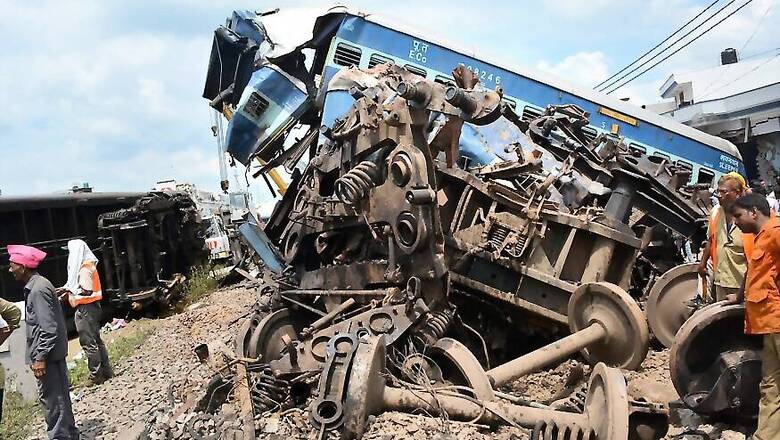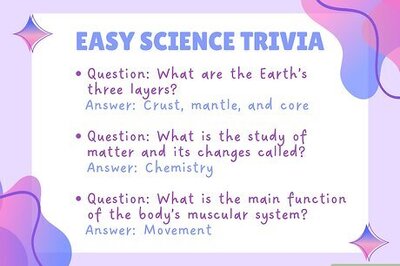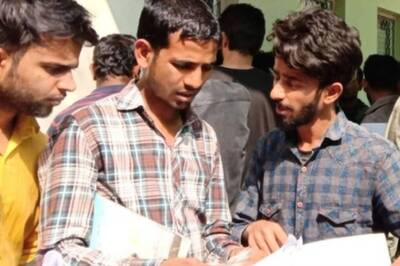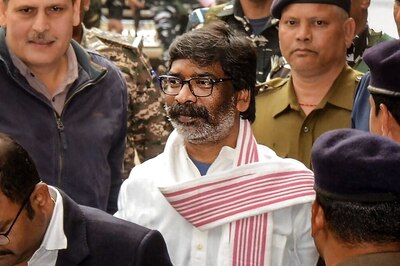
views
Dear Mr. Prime Minister,
A few days back, when I wrote an article — ‘Tragedy of Indian Railways: Suresh Prabhu Walks the Talk, But That’s Not Enough’, for News18.Com, little did I realize that a storm brewing in the Indian Ocean was soon going to turn into a tsunami that would destroy whatever little was left of 164 years old Indian Railways.
Let me first take the stock of the debris left behind by the storm that started with the derailment of 14 coaches of Utkal Express on August 20, in which 24 passengers died and 150 received injuries. It was soon followed by the derailment of 9 coaches of Kaifyati Express, injuring 50 passengers.
Sir, I, as a lifelong railway-man and a citizen, fully support your call: ‘Zero Tolerance for Accidents’. But let me share the bitter truth that far too many accidents happen because of ‘Chalta Hai’ attitude, which vowed to eradicate in this year’s Independence Day speech.
Though we are yet to get to the root cause of these ‘accidents’, prima-facie the needle of suspicion for Utkal Express derailment fell on Civil Engineering Department — one of the ten ‘silos’ of the Indian Railways. The Kaifyati Express tragedy, it appears, was beyond railways’ control. The truth of the twin-tragedy will emerge after statutory enquiry by the Commissioner Railway Safety, postmortem expert of railway accidents.
But at the cost of sounding insensitive, I would say there was nothing new or special about these derailments. Statistics from just one city can send shivers down anyone’s marrow: In 2015 and 2016, total number of passengers killed in Mumbai Suburban Network was 6506 and the number of those injured stood at 6612.
The report of High-Power Committee on Safety (2012), headed by Dr Anil Kakodkar unmistakably established that the track-record of UPA government, with 6000 deaths per annum on Mumbai tracks, was far worse.
However, the latest rail twin-tragedy and its aftermath inflicted grievous collateral damage on railways which was already tethering at the brink of disaster.
FOUR RECENT DEVELOPMENTS AND THEIR MESSAGE
Firstly, when Railway Minister Suresh Prabhu fixed the responsibility on the entire chain of command — Member (Engineering) Railway Board, General Manager (Northern Railway), Division Railway Manager (Delhi), Senior Divisional Engineer, Assistant Engineer and Two Sectional Engineers — I, unaware of the tsunami brewing, wrote “Prabhu walks the talk” in my News18 piece. But soon I realized that the day of decisive action by the minister was also one of rejoice for nine other ‘silos’ of railways. Many feasted at the travesty of one silo — the Engineering department — being made the Bali-Ka-Bakra. The General Manager, Northern Railway, an electrical engineering officer, was described as a circumstantial victim.
Secondly, when I praised the decisive action on social media, some railway personnel — present and past — demanded the sacking of Railway Board Chairman. Others said Prabhu himself should resign.
Thirdly, when the second tragedy took place, even I said entire railway board should be sacked. I was more emotional than rational — Sir, I recently lost my cousin-sister (much younger) in the Patna-Indore Express accident. And soon, your government replaced the existing Railway Board Chairman with Ashwani Lohani, the ‘turn-around man’. To my utter disgust, the news of departure of Railway Board Chairman was met with secret celebrations in Rail Bhawan corridors. Few outside Railway fraternity would know why such a sad exit of their operational chief was celebrated by railway-men. Here’s the reason: The outgoing Railway Board Chairman was a rank outsider, belonging to ‘stores department’, considered untouchable to the main ‘silos’.
Fourthly, soon after the news Railway Board Chairman’s departure became public, Prabhu visited you, Mr. Prime Minister. In a series of tweets after the meeting, he said he accepted ‘full moral responsibility’ for the accidents and has offered you his resignation. By doing so, he has already raised his stature as railway minister, by becoming only the fourth railway minister to offer resignation after deaths of innocent people in railway accidents.
Prime Minister Nehru had accepted resignation of Lal Bahadur Shastri as Railway Minister and the latter replaced him as Prime Minister. Nitish Kumar was brought back as Railway Minister to serve another term, three years later. And Vajpayee had the sagacity to reject resignation of Mamata Banerjee.
Sir, as Prime Minister, you are the chief arbiter of capability and performance of ministers. But as a student of Indian railways and as a member of commentariat la-affaire Indian Railways, I do believe his departure will be victory of those who wish to perpetuate status quo in railways.
I have seen the raw passion of Mr Prabhu for the railways. In 1993, as head of Saraswat Bank, he held Nukkad-Sabha in Mumbai to raise money for Konkan Railway through tax-free bonds. One has also seen his zeal for reforms as a minister. Let truth be spoken, his reformist push — selectively implementing Bibek Debroy Committee report and taking away the power of railway board mandarins of tendering and awarding contracts, and delegating it to General Managers — has earned him many enemies.
LESSONS FROM THE PAST
Let me tell a tale which few know or remember today — it is from another era-Circa 1981, when Prime Minister Indira Gandhi ruled India. June 6 that year was the worst day in the history of Indian Railways when at a non-descript place, Badla-Ghat (literally meaning place of revenge), between Mansi and Saharsa in Bihar, an entire train plunged into the surging Bagmati river, killing around 800 passengers. Worse, the search and rescue operations were called off after finding 246 bodies, fully decomposed.
Unrepentant, Kedar Pande, the then Railway Minister continued to rule over his fiefdom from the corner office at Raisina Road. He and his arch rival Jagganath Mishra, who was then chief minister of Bihar, sparred publicly. But the joker of the pack turned out to be PMN Murthy, Chief Commissioner Railway Safety (CMRS) who conducted the enquiry. Findings of the CMRS were rather perverse: He propounded cyclonic storm theory, according to which, the Galle winds pushed train off the bridge.
This was the most sordid cover-up of the worst railway accident in Indian history. Ironically, as confirmed by many eyewitnesses, the real cause of the accident was that the train driver suddenly applied the brake because a farmer and his bull were on the track; this jolted the coaches into the water.
I recall this 36 years old story after the twin-tragedy of August 2017 because in 1981 we converted a man-caused accident into the one caused by cyclone. On the contrary, the ripple-effect of the latest twin-tragedy is that it has, in true sense, ravished and destroyed the status quo in railways like a tsunami.
NINE PROBLEMS WITH INDIAN RAILWAYS
This is just the flash point; this one-time great institution has been terminally ill for years. Reasons are multiple, but I will make an attempt to count some of them.
One, the body and soul of railways has been trampled with by those whose job was parenting and nurturing it — the railway ministers. Since Independence, railways has been treated as the ‘Jagir’ of the ministers, and for two decades before you became Prime Minister, it was bartered as ‘Dahej’ to the most raucous coalition partner. In the past seven decades, I know not of more than half a dozen railway ministers whose concern has been the present and future of railways.
Two, it is an axiomatic truth that 21st century Indian Railways, is being run, with technology of early 20th century and management practices of 19th century. Skill level of more than 50% railway staff is abysmally poor and the obsolete maintenance practices of British era still rule the roost. It is no surprise that accidents happen.
Three, railway board, which was created for limited purpose of policy formulation, inspection and to provide guidance to operating units, has over a period of time become bloated unwieldy, and an overarching controller. The justification for the railway board, as it exists today, became time barred decades back, and now it not only clings on, but with every passing day acquires more obstructive powers. Without immediate creative destruction of the railway board, Indian Railways has no future.
Four, at operational level, the Railways is organized in the most suboptimal manner. A decade back, to improve operational efficiency, Chinese Railway abolished an entire tier in one go. Contrarily, the number of zonal railway head quarters and divisional railway head quarters has grown haphazardly in our country and the sole criteria of creating a new zone and division has been the political expediency and whims of the minister in-charge. Whenever an accident took place, Railway Board honchos surrendered meekly to safeguard their personal interest. And the obvious result is that the Railways, which was once the pride of the nation, today has seen a fall — freight has moved to high-capacity trucks on upgraded highways, and passengers have moved to buses and air. The decline now is both in percentage and absolute terms.
Five, since it was the original cash cow, multiple governments with impunity called upon it to take all the government burden of varied level of social obligations, milked the system beyond capacity, priced services ridiculously, misallocated its resources and still forced it to pay hefty dividend. When the law of diminishing return caught up with Railways at least two decades back and internal accruals vanished, creative accounting, falsification and plain lies were resorted to for presenting a rosy picture of railway finances. Soon, the naked truth was out: Railways became a bankrupt organization with no money to invest in basic work of operational improvements and rudimentary safety.
Six, state of the infrastructure is pathetic. Conservatively speaking, we are behind in track renewal work by at least 40 years. The race to start new trains and extending the length and frequency of services, has resulted in a situation where Railways has breached safety reserves of passenger coaches for routine maintenance and freight wagons are in dire need aggressive modernization. Even if accidents cannot be avoided, the death and injury per accident can be drastically reduced. But at current level of preparedness, replacing all killer ICF coaches will need anything between 25 and 40 years.
Seven, Indian Railways is a unique entity. Ever since its birth it has been studied by more number of committees than probably all other government entities taken together. Yours truly, Mr. Prime Minister, as only other member of One-Member E Sreedharan Committee, could read and record the findings from only 50000 pages of such committee reports. Most Committees have been set up by Indian Railways itself, but sadly not even simplest and rational recommendations have been implemented.
Eight, Indian Railways, from top to bottom, is organized at departmental lines with overarching departmental loyalty, much to the detriment of the organizational interest. Three basic necessities of a forward looking transport organization — commercial orientation, consumer focus and zero defect orientation (zero tolerance to incidents) are missing at all levels.
Nine, Suresh Prabhu is the victim and not the culprit. The Railway Board has expertise in killing the best of ideas and transforming the best practices of a minister into pedestrian one. Only you, Mr. Prime Minister, can save Indian Railways from the Railway Board.
EIGHT SOLUTIONS TO TRANSFORM RAILWAYS
One, abolish Ministry of Railways. Rationalizing ministries is one of the hallmarks of your governance plank. Let railway ministry be subsumed as part of overarching Transport Ministry. Such an action is even otherwise needed for coordinated modular symbiotic growth of different modes of transport. With this, also abolish the Railway Board, as it exists, today.
Two, recreate a small railway board as a holding company for operating units. This should be part of disrupting the existing business model of railways. It will need an accomplished person to manage change and you have already brought in the right Chairman for transition management. There will be an urgent need of collapsing present zones into four/five self-sustaining companies.
Three, just pick up four of the latest reports on Indian Railways – Bibek Debroy Committee, E Sreedharan Committee, Anil Kakodkar Committee and Sam Pitroda Committee. They have enough wisdom. The key is speedy implementation.
Four, the change is painful and Indian Railways is a viscerally change resistant. Bring a ‘Chief Change Officer’ and institute a change management team. Let railways change to the total meritocracy. Let the dictum be move up or move out, shape up or shut out. Also, it is about time to have practices, as properly prescribed by an ‘updated’ Act, that are best suited for Railways’ present and future needs.
Five, with immediate effect, take dedicated freight corridors and high-speed passenger corridors from the ambit and control of Indian Railways. Let safety be a daily pursuit for the whole organization for next ten years. It will need a complete cultural shift and brand new safety orientation and safety organization.
Six, except strategic lines, put total expenditure ban on any investment in a new line, including those which are in progress, sole exception being last mile urgent projects. The word ‘implementation bug’ coined by Kakodkar is the enemy of railways.
Seven, the actual money required to make train travel safe is humungous. While the Kakodkar Committee recommendations are being implemented on war footing, let the total financial implications be estimated.
Eight, let there be acceptance of the axiomatic truth that Railways in India and Indian Railways are two distinct entities. It is time for this self-fulfilling fallacy to go. This will call for total innovation and such innovation can come only from top. It is also time to infiltrate the organization with experts and expertise in critical areas of importance.
Finally, Mr Prime Minister, please take a personal challenge to roll out a comprehensive, new National Railway Policy, before next Independence Day.
Road ahead is steep and uncharted. You seem to be open to taking such a challenge.
Sincere Regards.
(The author is a railway expert and was formerly an Indian Railway Accounts Service Officer. He was co-opted by Ministry of Railways as part of One-Man E Sreedharan Committee on Railways)



















Comments
0 comment